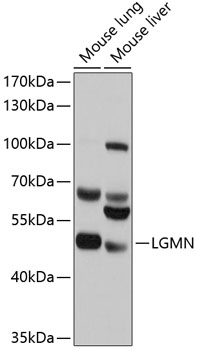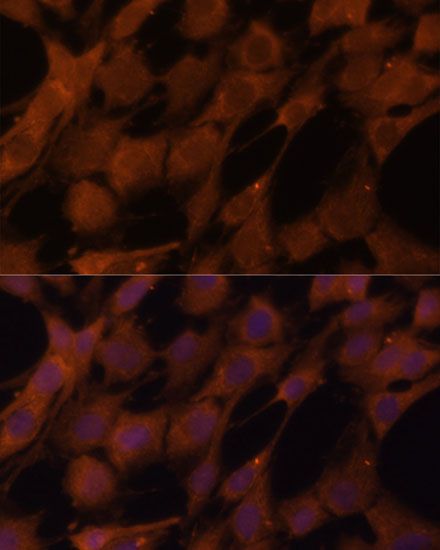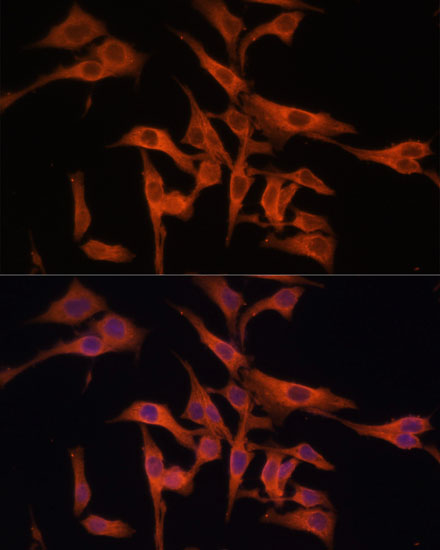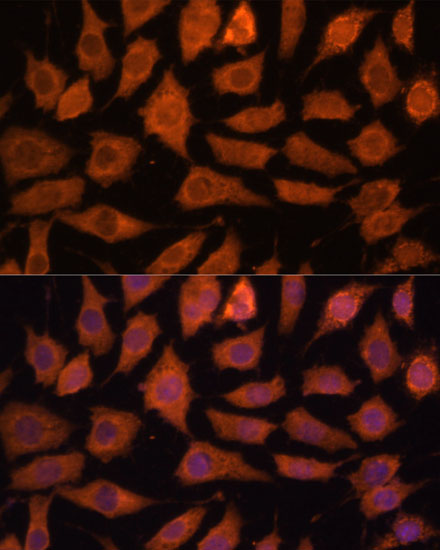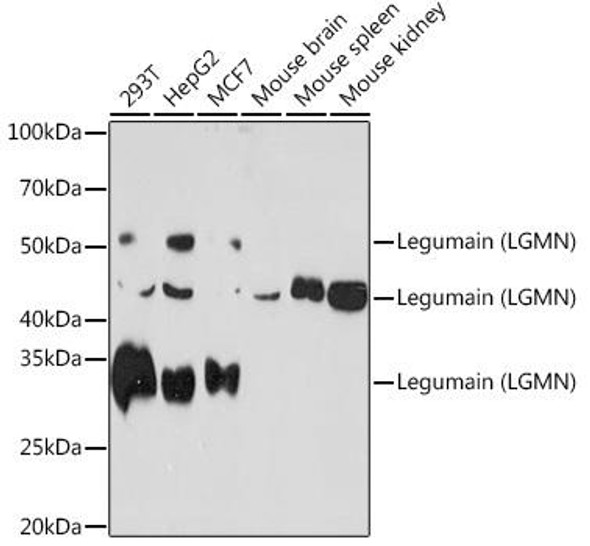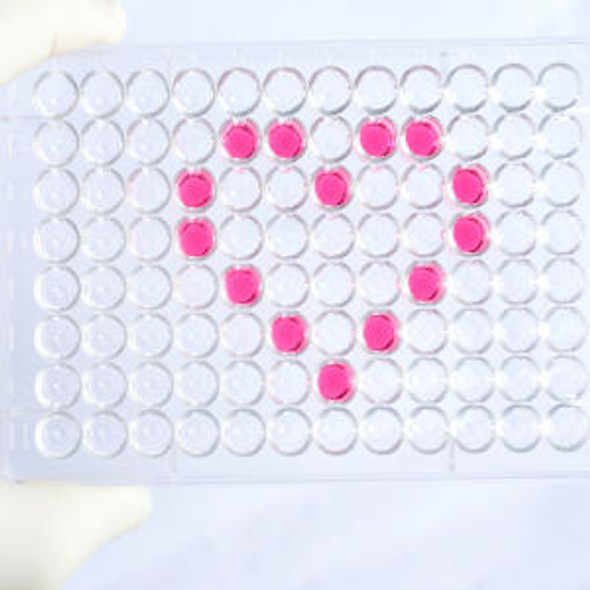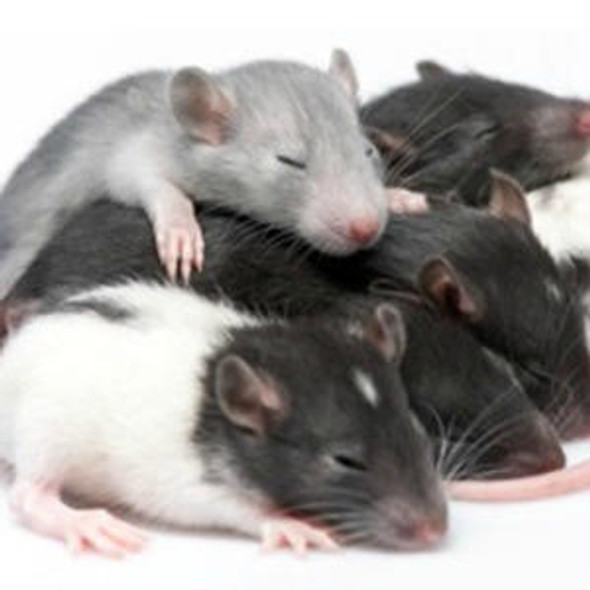Anti-LGMN Antibody (CAB10570)
- SKU:
- CAB10570
- Product type:
- Antibody
- Reactivity:
- Human
- Mouse
- Rat
- Host Species:
- Rabbit
- Isotype:
- IgG
- Antibody Type:
- Polyclonal Antibody
- Research Area:
- Cell Biology
Frequently bought together:
Description
| Antibody Name: | Anti-LGMN Antibody |
| Antibody SKU: | CAB10570 |
| Antibody Size: | 20uL, 50uL, 100uL |
| Application: | WB IF |
| Reactivity: | Human, Mouse, Rat |
| Host Species: | Rabbit |
| Immunogen: | Recombinant fusion protein containing a sequence corresponding to amino acids 18-323 of human LGMN (NP_001008530.1). |
| Application: | WB IF |
| Recommended Dilution: | WB 1:1000 - 1:2000 IF 1:50 - 1:200 |
| Reactivity: | Human, Mouse, Rat |
| Positive Samples: | Mouse lung, Mouse liver |
| Immunogen: | Recombinant fusion protein containing a sequence corresponding to amino acids 18-323 of human LGMN (NP_001008530.1). |
| Purification Method: | Affinity purification |
| Storage Buffer: | Store at -20°C. Avoid freeze / thaw cycles. Buffer: PBS with 0.02% sodium azide, 50% glycerol, pH7.3. |
| Isotype: | IgG |
| Sequence: | VPID DPED GGKH WVVI VAGS NGWY NYRH QADA CHAY QIIH RNGI PDEQ IVVM MYDD IAYS EDNP TPGI VINR PNGT DVYQ GVPK DYTG EDVT PQNF LAVL RGDA EAVK GIGS GKVL KSGP QDHV FIYF TDHG STGI LVFP NEDL HVKD LNET IHYM YKHK MYRK MVFY IEAC ESGS MMNH LPDN INVY ATTA ANPR ESSY ACYY DEKR STYL GDWY SVNW MEDS DVED LTKE TLHK QYHL VKSH TNTS HVMQ YGNK TIST MKVM QFQG MKRK ASSP VPLP PVTH LDLT PSPD VPLT IMKR KLMN TN |
| Gene ID: | 5641 |
| Uniprot: | Q99538 |
| Cellular Location: | Lysosome |
| Calculated MW: | 42kDa/49kDa |
| Observed MW: | 54kDa |
| Synonyms: | LGMN, AEP, LGMN1, PRSC1, legumain |
| Background: | This gene encodes a cysteine protease that has a strict specificity for hydrolysis of asparaginyl bonds. This enzyme may be involved in the processing of bacterial peptides and endogenous proteins for MHC class II presentation in the lysosomal/endosomal systems. Enzyme activation is triggered by acidic pH and appears to be autocatalytic. Protein expression occurs after monocytes differentiate into dendritic cells. A fully mature, active enzyme is produced following lipopolysaccharide expression in mature dendritic cells. Overexpression of this gene may be associated with the majority of solid tumor types. This gene has a pseudogene on chromosome 13. Several alternatively spliced transcript variants have been described, but the biological validity of only two has been determined. These two variants encode the same isoform. |
| UniProt Protein Function: | LGMN: Has a strict specificity for hydrolysis of asparaginyl bonds. Can also cleave aspartyl bonds slowly, especially under acidic conditions. May be involved in the processing of proteins for MHC class II antigen presentation in the lysosomal/endosomal system. Belongs to the peptidase C13 family. |
| UniProt Protein Details: | Protein type:EC 3.4.22.34; Protease Chromosomal Location of Human Ortholog: 14q32.12 Cellular Component: lysosomal lumen; lysosome Molecular Function:cysteine-type endopeptidase activity; peptidase activity Biological Process: antigen processing and presentation of exogenous peptide antigen via MHC class II; negative regulation of neuron apoptosis; proteolysis; proteolysis involved in cellular protein catabolic process; receptor catabolic process; renal system process; toll-like receptor signaling pathway; vacuolar protein processing; vitamin D metabolic process |
| NCBI Summary: | This gene encodes a cysteine protease that has a strict specificity for hydrolysis of asparaginyl bonds. This enzyme may be involved in the processing of bacterial peptides and endogenous proteins for MHC class II presentation in the lysosomal/endosomal systems. Enzyme activation is triggered by acidic pH and appears to be autocatalytic. Protein expression occurs after monocytes differentiate into dendritic cells. A fully mature, active enzyme is produced following lipopolysaccharide expression in mature dendritic cells. Overexpression of this gene may be associated with the majority of solid tumor types. This gene has a pseudogene on chromosome 13. Several alternatively spliced transcript variants have been described, but the biological validity of only two has been determined. These two variants encode the same isoform. [provided by RefSeq, Jul 2008] |
| UniProt Code: | Q99538 |
| NCBI GenInfo Identifier: | 2842759 |
| NCBI Gene ID: | 5641 |
| NCBI Accession: | Q99538.1 |
| UniProt Secondary Accession: | Q99538,O00123, Q86TV2, Q86TV3, Q9BTY1, |
| UniProt Related Accession: | Q99538 |
| Molecular Weight: | Observed MW: 54kDaCalculated MW: 42kDa/49kDa |
| NCBI Full Name: | Legumain |
| NCBI Synonym Full Names: | legumain |
| NCBI Official Symbol: | LGMN |
| NCBI Official Synonym Symbols: | AEP; LGMN1; PRSC1 |
| NCBI Protein Information: | legumain |
| UniProt Protein Name: | Legumain |
| UniProt Synonym Protein Names: | Asparaginyl endopeptidase; Protease, cysteine 1 |
| UniProt Gene Name: | LGMN |


